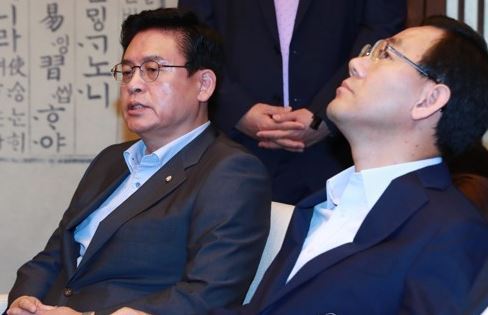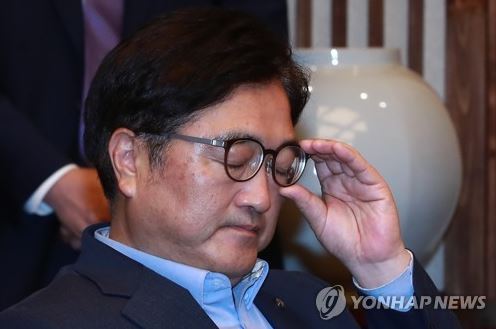The prospects of two Constitutional Court nominees remained uncertain Monday as opposition parties ramped up their offensive over the duo's alleged ideological bias.
Major parties agreed to hold a parliamentary confirmation hearing for justice nominee Lee You-jung next Monday and decided tentatively to set up a vote on Constitutional Court President-designate Kim Yi-su four days later.
But opposition lawmakers heaped pressure on President Moon Jae-in to withdraw Lee's nomination, which they argued she does not deserve due to her past support for a liberal candidate in a 2011 Seoul mayoral election.
 |
Chung Woo-taik (L) and Joo Ho-young, the floor leaders of the main opposition Liberty Korea Party and Bareun Party, respectively, attend a meeting with parliamentary speaker Chung Sye-kyun at the National Assembly in Seoul on Aug. 21, 2017. (Yonhap) |
Speculation also persists that the issue surrounding Lee could hamper the parliamentary approval process for Kim, who himself has come under fire for what detractors call his "left-wing streak."
The floor leaders of the four major parties gathered in the morning to discuss the contentious nominees, but failed to narrow their differences.
"The controversy has been triggered as (the president) sent to parliament a figure that has not been vetted," Chung Woo-taik, the floor leader of the main opposition Liberty Korea Party, said during the meeting. "The president should retract the nomination."
Kim Dong-cheol, the floor leader of the minor People's Party, warned that the court could descend into a "political institution" should a politically skewed figure join the nine-member bench.
The ruling Democratic Party defended the nominees, highlighting the urgency of filling the court's top post that has been vacant since former President Park Han-chul retired in January.
 |
Woo Won-shik, the floor leader of the ruling Democratic Party, attends a regular meeting with parliamentary speaker Chung Sye-kyun at the National Assembly in Seoul on Aug. 21, 2017. (Yonhap) |
"The void has not been filled for an unprecedentedly long period of time ... It is not a matter that we can delay any further," Woo Won-shik, the party whip, said.
At issue is Lee's backing for Park Won-soon, a former progressive civil activist and the incumbent Seoul mayor, during the 2011 election. Though she was then a private attorney with no political affiliation, critics said her endorsement for Park could undermine the court's core principle of political neutrality.
The dispute surrounding Kim centers on his 1980 ruling against a pro-democracy activist and his minority opinion against the 2014 disbandment of a far-left political party involving members accused of pro-North Korean activities.
Kim's appointment requires consent from a majority of lawmakers present during a floor vote that can be set up by a majority of all 299 legislators. The ruling party holds only 120 seats, making it necessary to secure opposition support.
Lee's appointment, meanwhile, does not require parliamentary consent. (Yonhap)









![[Weekender] Korea's traditional sauce culture gains global recognition](http://res.heraldm.com/phpwas/restmb_idxmake.php?idx=644&simg=/content/image/2024/11/21/20241121050153_0.jpg)